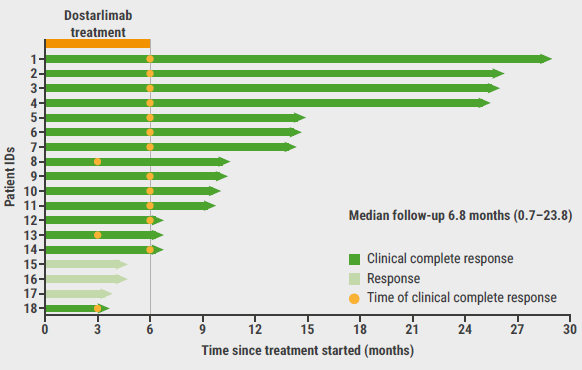https://doi.org/10.55788/a3fc7a36
“Locally advanced rectal cancer is treated with a combination of chemotherapy, radiation, and optional surgery, with all its costs and life-altering consequences,” said Dr Andrea Cercek (Memorial Sloan Kettering Cancer Center, NY, USA) [1]. Patients with dMMR rectal cancer are relatively resistant to chemotherapy but are responsive to checkpoint inhibitors [2,3]. The current phase 2 study aimed to assess whether neoadjuvant PD-1 inhibition may be able to replace chemotherapy, chemo- and radiation therapy, or chemotherapy, radiation therapy, and surgery in patients with dMMR rectal cancer.
For this purpose, 30 patients received dostarlimab (500 mg, intravenous, every 3 weeks) for 6 months followed by radiologic and endoscopic evaluation. If a clinical complete response was achieved, a wait-and-see approach was installed with 4-monthly follow-up visitations. If residual disease was detected, patients received chemoradiation. After completion of this therapy, another evaluation would decide if surgery was needed. The primary objectives were the overall response rate of PD-1 blockade with or without chemoradiation and the pathologic or clinical complete response rate at 12 months after PD-1 therapy with or without chemoradiation.
Spectacularly, all 14 patients that have been analysed to date reached a clinical complete response on dostarlimab therapy alone. Moreover, the responses were ongoing in all assessed patients after a median follow-up of 6.8 months (see Figure). Furthermore, no grade 3 or 4 adverse events were reported in these patients.
Figure: Duration of clinical complete response on dostarlimab treatment [3]

According to Dr Cercek, PD-1 inhibition may eliminate the need for chemotherapy and radiation in patients with early-stage dMMR rectal cancer and may rapidly translate to areas without access to modern chemotherapy, radiation, and surgery. It will spare patients from toxicity and late effects of chemo- and radiation therapy and surgery.
“Based on the data of this study, off-protocol use of neoadjuvant immunotherapy in this population is likely to occur,” expected Dr Kimmie Ng (Dana-Farber Cancer Institute, MA, USA), who commented on this late-breaking abstract. Dr Ng commented that the results are spectacular, but that larger sample sizes, longer follow-up time, and results from other endpoints are needed before standard-of-care may be changed in this population.
- Cercek A, et al. Single agent PD-1 blockade as curative-intent treatment in mismatch repair deficient locally advanced rectal cancer. LBA5, ASCO 2022 Annual Meeting, 3–7 June, Chicago, IL, USA.
- Cercek A, et al. Clin Can Res. 2020;26(13):3271‒3279.
- Andre T, et al. NEJM. 2020;383;2207–2218.
Copyright ©2022 Medicom Medical Publishers
Posted on
Previous Article
« Triplet chemotherapy beats doublet chemotherapy in colorectal cancer liver metastases Next Article
Panitumumab beats bevacizumab in RAS wildtype left-sided metastatic colorectal cancer »
« Triplet chemotherapy beats doublet chemotherapy in colorectal cancer liver metastases Next Article
Panitumumab beats bevacizumab in RAS wildtype left-sided metastatic colorectal cancer »
Table of Contents: ASCO 2022
Featured articles
Breast Cancer
Sacituzumab govitecan meets primary endpoint
Shaky OS results of palbociclib in ER-positive/HER2-negative breast cancer
Practice-changing results of T-DXd in HER2-low breast cancer
SET2,3 to inform on chemotherapy decisions in ER-positive breast cancer
Metastasis-directed therapy fails in oligometastatic breast cancer
Analysis by residual cancer burden further clarifies effect of pembrolizumab
Contribution of metastatic therapies on mortality reduction in breast cancer
Radiotherapy may be omitted in breast cancer patients
Promising data for ribociclib after progression on ET plus CDK4/6 inhibitors in HR-positive/HER2-negative metastatic breast cancer
7-gene biosignature: Benefits of endocrine therapy and radiotherapy in breast cancer risk groups
Lung Cancer
Additional tiragolumab does not help patients with untreated small cell lung cancer
Success for serplulimab plus chemotherapy in small cell lung cancer
Adagrasib safe and clinically active in non-small cell lung cancer
Long-term benefits of combined immunotherapy over chemotherapy in non-small cell lung cancer
Effect of KRAS mutations and PD-L1 expression on therapy response in non-small cell lung cancer
Melanoma
First results on distant metastasis-free survival in stage II melanoma
Higher response rates for concurrent triple therapy versus sequential therapy in melanoma
Genitourinary Cancers
Exploratory treatment options fail in ccRCC
Adjuvant everolimus did not benefit high-risk renal cell carcinoma
Cabozantinib fails as first-line maintenance therapy in urothelial cancer
177Lu-PSMA-617 is a valid treatment option for PSMA-positive mCRPC
Enzalutamide performs well in metastatic hormone-sensitive prostate cancer
Haematologic Malignancies
Autologous stem cell transplantation plus RVd improves PFS in multiple myeloma
Novel first-line treatment option for mantle cell lymphoma
Promising results for novel CAR-T therapy in relapsed/refractory multiple myeloma
Gastrointestinal Cancers
Panitumumab beats bevacizumab in RAS wildtype left-sided metastatic colorectal cancer
Spectacular results for dostarlimab in mismatch repair deficient rectal cancer
Triplet chemotherapy beats doublet chemotherapy in colorectal cancer liver metastases
To resect or not to resect primary tumours in stage IV colon cancer?
Novel treatment option for KRAS wildtype pancreatic cancer
Gynaecological Cancers
Primary results of rucaparib in ovarian cancer
Trabectedin not superior to chemotherapy in recurrent epithelial ovarian cancer
Encouraging results of relacorilant in ovarian cancer
Miscellaneous Topics
Bacterial decolonisation effective against radiation dermatitis
New standard-of-care for cisplatin-ineligible locally advanced head and neck squamous cell carcinoma
Ifosfamide is likely to be the go-to therapy in recurrent Ewing sarcoma
Dabrafenib plus trametinib candidates for standard-of-care in BRAF V600-mutated paediatric low-grade glioma
Related Articles

February 17, 2022
SABCS 2021 Focus in Genomic Profiling

© 2024 Medicom Medical Publishers. All rights reserved. Terms and Conditions | Privacy Policy

